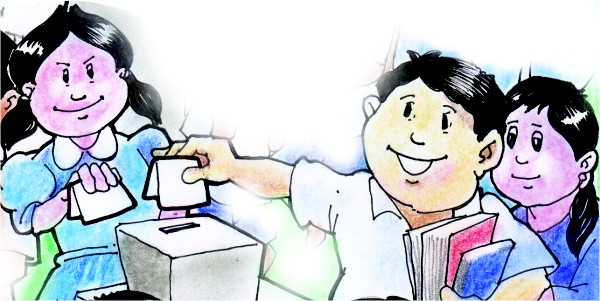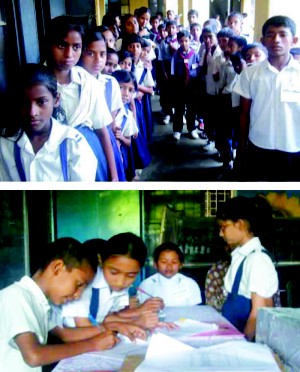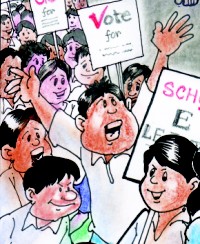| Cover Story
From Moulvibazar
Student Council Elections at Primary Schools
After successfully piloting the concept at 100 primary schools in 2010, Student Council Elections were held across Bangladesh in 600 schools in June 2011. The new concept fosters leadership skills in students and enables the student to learn and practice the principles of democracy from an early stage of their lives.
...........................................................................................................
Rajat Kanti Goswami &
Zahidul Naim Zakaria
How much do we learn from schools? Education should not merely be the pursuit of knowledge, but at an elementary level, it is also supposed to equip a person to meet the challenges of daily life. Much needed life skills are hardly ever learnt from classroom activities and tasks; they are better learned through relationships forged with teachers, peers and friends and through the extra curricular activities that bring them together. One such tremendous experience is being an elected member of a student council, through which students learn to lead, work together and above all, learn to become responsible. Globally, student councils have become an vital part of most schools. A Student Council is an elected body of student representatives who become the voice of the entire student body in the school and communicate their views on various subjects.

The elected members of a student council become a link between the student body and the school administration. Often, school councils are involved in organizing various events which creates the opportunity to include topics of interest to the students and make learning fun. The students involved with the student council develop several leadership and communication skills in the path of handling responsibilities.
A student who is part of a student council tends to pick up on leadership abilities, a much needed life skill. Without role models to follow, without a source of inspiration, few find the level of motivation required to excel in their studies, let alone in their professional lives. The nature of student councils and the responsibilities of the representatives may differ across schools. But its nurturing effects on students and its contribution to the developmental activities in the school are qualities common to all school councils. They contribute significantly in making schools a better place of learning, that too with the direct input of students themselves.
In 2010, student councils in the form of a shadow parliamentary system of governance was first launched in the country in 100 schools on a pilot basis. The initiative was first conceptualized for Bangladeshi primary schools by the Prime Minister's Private Secretary Md Nazrul Islam Khan (N I Khan) who visited different countries of the world to gather experience about Student Councils. In regard to student councils, Deputy Director of Directorate of Primary Education M. Fasiullah had told BSS, 'After witnessing huge enthusiasm about the Student Council among students, teachers and even the guardians at those 100 schools, we have decided to form councils at 600 primary schools this year.' BSS quoted N I Khan saying, 'We are frequently witnessing clashes and violence centering the activities of student at college and university level, as they (students) were never taught how to practice democratic norms, show tolerance to other opinions and learn the true essence of leadership at school level.'
STUDENT COUNCIL ELECTIONS AT BAZAAR GOVERNMENT MODEL PRIMARY SCHOOL
On Saturday, 11 June 2011, students of Bazaar Government Model Primary School at Moulvibazar have exercised their voting rights in a special election arranged by the students of the school themselves, under the supervision of the Primary Education Department. The initiative targets evoking future leaders, practicing democracy from an early age and involving students with the development of their school. Student councils, in time, are also expected to reduce dropout of young learners, and to build better communications between the school, teachers, parents and other stakeholders. Bayezid Khan, the Assistant District Primary Education Officer of Moulvibazar said, 'Such student councils will help the students to practice and learn about democracy, whilst improving the quality of leadership. Students can express their demands through the council in an organized manner.'
 Primary School students from class III to class V participated in the student council election. Like a national election, posts of Election Commissioner, Presiding Officer, Assistant Presiding Officer and Polling Officers were in place, and all election authority positions were filled by students. After the election, one is supposed to be selected or elected as prime minister by voice vote from among the members of the council. Then the elected prime minister is expected to distribute portfolio among his or her cabinet like a parliamentary system of democracy. Ministers will look after ministry for education, midday meal, environment, health, water resource, teaching materials, cultural affairs and sports, reception of guests and others as per the recommendations of the general students. Primary School students from class III to class V participated in the student council election. Like a national election, posts of Election Commissioner, Presiding Officer, Assistant Presiding Officer and Polling Officers were in place, and all election authority positions were filled by students. After the election, one is supposed to be selected or elected as prime minister by voice vote from among the members of the council. Then the elected prime minister is expected to distribute portfolio among his or her cabinet like a parliamentary system of democracy. Ministers will look after ministry for education, midday meal, environment, health, water resource, teaching materials, cultural affairs and sports, reception of guests and others as per the recommendations of the general students.
During the polling period, the scene was awe-inspiring! 'Child election officials' managed all matters with discipline. They checked voters' names, issued ballot papers to voters by keeping signatures and marked voters' fingers with ink. Voters have also acted responsibly by waiting in queue for a long time to vote. Casting of vote was held from 9 am to 1 pm. After casting the vote, counting was held peacefully. Teachers of the school and officers of the Primary Education Department have supervised all the activities regarding election. In Bazaar Government Model Primary School student council election, there were 300 enlisted voters. All the students of the school from class III to Class V were the registered voters. There were 18 candidates against seven posts of the council. Reba Goswami, a senior teacher of the school, said, 'we made the students realize the importance of having a student council and discussed arranging the election process with them. This election event will eventually help the children become better leaders in the society in days to come'.
 Omar Faruque Student of class V was the Election Commissioner. Roney Miah of Class V and Mohtarana Zuniya of Class IV were the presiding officer and Assitant Presiding officers. Rafiqul Islam of Class V, Prapti Chakrabarty of Class IV and Somapti Rishil of Class III were Polling officers in the election. Roney Miah informed Star Insight, much like a matured man, that all activities were going very well as planned. There were no problems from voters. All teachers and Primary Department Officers were helping them. Replying to a question, he said a total of 241 voters out of 300 voted in the election. After counting of the votes, Election Commissioner Omar Faruque declared that Eka Rani Roy, Tareque Miah and Chand Miah of Class V, Sumaiya Akhter Laboni and Tanzina Akter of Class IV and Ahlan Sahlan Liton and Bristi Khatun of Class III had been elected. Abdul Basit, The Headmaster of Bazaar Govt. Primary School said, 'such an election will encourage the students to be more attentive to their studies since they are becoming an integral part of the school and the tendency of dropout will be lessened.' Omar Faruque Student of class V was the Election Commissioner. Roney Miah of Class V and Mohtarana Zuniya of Class IV were the presiding officer and Assitant Presiding officers. Rafiqul Islam of Class V, Prapti Chakrabarty of Class IV and Somapti Rishil of Class III were Polling officers in the election. Roney Miah informed Star Insight, much like a matured man, that all activities were going very well as planned. There were no problems from voters. All teachers and Primary Department Officers were helping them. Replying to a question, he said a total of 241 voters out of 300 voted in the election. After counting of the votes, Election Commissioner Omar Faruque declared that Eka Rani Roy, Tareque Miah and Chand Miah of Class V, Sumaiya Akhter Laboni and Tanzina Akter of Class IV and Ahlan Sahlan Liton and Bristi Khatun of Class III had been elected. Abdul Basit, The Headmaster of Bazaar Govt. Primary School said, 'such an election will encourage the students to be more attentive to their studies since they are becoming an integral part of the school and the tendency of dropout will be lessened.'
Bangladesh is often blamed to have a culture of great initiations which are not followed through. Let's hope that the new culture of having democratic elections in public schools is sustainable, and that they are organized every year regularly. In doing so, students will not merely learn about the importance of each person's opinion which ultimately culminates into a majority decision, but they will become better and more-informed leaders. Maybe, in time, they will become the new breed of leaders who are able to guide Bangladesh out of its plethora of plights towards a future of unprecedented prosperity.
Copyright
(R) thedailystar.net 2011
|
|
